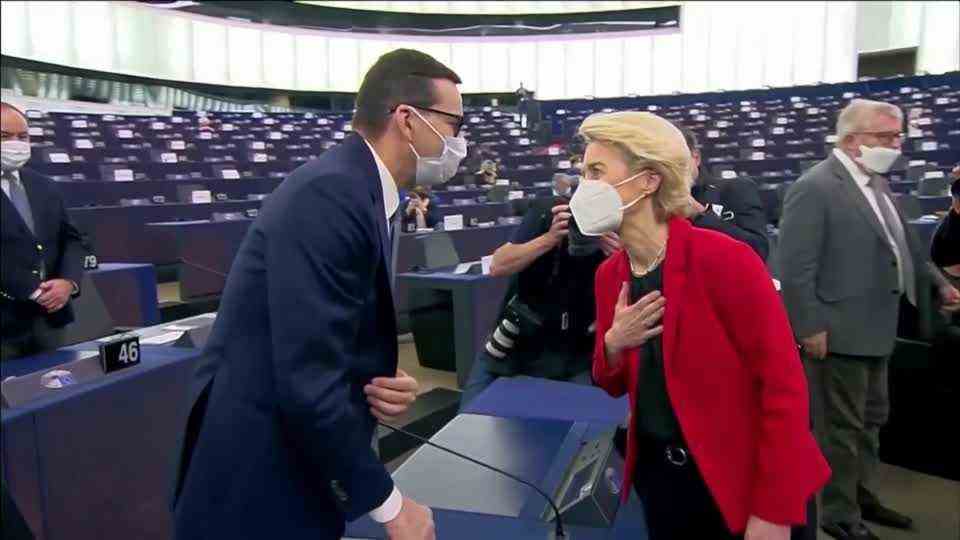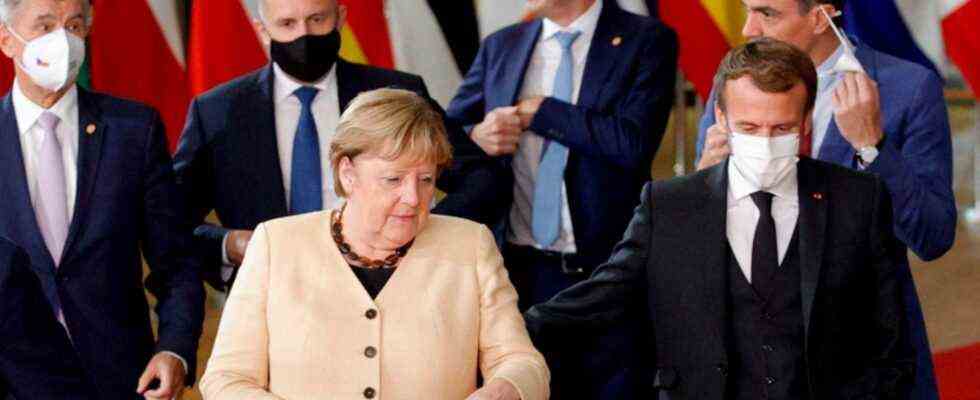Farewell to the Chancellor
The (short) final summit dinner: the end of the EU era Merkel
Chancellor Angela Merkel speaks to Emmanuel Macron (front right), President of France, during a group photo at the EU summit in Brussels
© Olivier Matthys / AP / DPA
With the outgoing Chancellor Angela Merkel, an era also comes to an end for the EU. In 16 years she has participated in more than 100 EU summits and achieved success as a crisis manager. Nevertheless, Merkel will not go down in European history as a visionary.
Angela Merkel’s presumably last dinner in the EU Council building in Brussels started unusually late and ended unusually early. It was only around 10.30 p.m. on Thursday evening that the news came that the heads of state and government of the EU countries had withdrawn for dinner – less than an hour and a half later, the first armored limousines drove up to take Merkel & Co to their hotels.
The farewell party planned for the German Chancellor had been postponed to Friday morning, it was said afterwards. The afternoon and evening discussions about the drastic rise in energy prices and the dispute over Poland’s handling of EU law and the rule of law would have dragged on for too long.
At least on the last topic, Merkel once again tried to mediate and prevent further escalation. “The rule of law is at the core of the European Union,” she said at the beginning. “On the other hand, we have to find ways and opportunities to get back together here.”
Hope Merkel: “Europe is female”
Merkel slipped into the role she has held for around 16 years at her first EU summit in December 2005. At the time, it was about the EU financial plan for the years 2007 to 2013, and there were huge hiccups between London and Paris. Merkel mediated between French President Jacques Chirac and British Prime Minister Tony Blair – with success.
Merkel was celebrated across all European borders for reaching an agreement in the budget dispute. The left-liberal Viennese newspaper “Der Standard” wrote at the time: “The Union is alive. And Europe is female. It took on a form of hope almost overnight. Her name: Angela Merkel.”
Pragmatism as a recipe for success
Merkel’s pragmatism and her skills as a moderator have helped the EU through numerous crises. There was the global financial crisis from 2007, the euro crisis from 2010, the refugee crisis in 2015 and, last but not least, the Brexit and the corona pandemic. When it came to keeping the business together, Merkel was there.
As a European thought leader, the CDU politician will not go down in history. Above all, her critics accuse her of not having drawn up a vision for the Europe of the future even after 16 years at the helm of the most populous and economically strongest EU country. Some even believe that they are partly to blame for the authoritarian developments in countries like Poland and Hungary because they rarely draw the red line.
From “Kohl’s girl” to world politician: A cartoonist remembers Angela Merkel
13 images
After 16 years Merkel: EU at a crossroads
At the end of its term of office, the EU is now at a crossroads: Onward to ever more common ground in Europe, as the founding states like Germany and France want. Or back to more national statehood, as the increasingly rebellious countries of Poland and Hungary are striving for.
“We will work resolutely to counter the risk of a deep gap in Europe in the long run,” Merkel said last year at the start of the German EU Council Presidency. During the following six months she was able to fill the gap with compromises on EU financial planning and climate protection. But the danger has not averted it, it is even growing again.
How deep the rift through the EU already is will be shown once again to Merkel at what is officially said to be the 107th EU summit. How the dispute with Poland about the primacy of EU law over national law is to be resolved is completely unclear. Words like “blackmail” and “witch hunt” are used. The Hungarian Prime Minister Viktor Orban speaks of a “battle” that has only just begun.
Calls for more toughness and less moderation
This dispute is now being continued without Merkel. If the SPD, the Greens and the FDP adhere to the timetable they agreed on Thursday for the coalition negotiations, Olaf Scholz will take Merkel’s place at the next EU summit on December 16 and 17. It remains to be seen whether the SPD politician will continue to act as moderator at the summits.

From the ranks of his possible future coalition partners, there are already calls for a significantly tougher course towards Poland and Hungary. “The next federal government must do much more to promote the rule of law and democracy in Europe and defend them by all means,” says the Greens politician Franziska Brantner, who heads the Europe working group in the coalition negotiations for her party.
Not the last farewell summit for Merkel
Merkel no longer has anything to do with this, and neither does her party. The Chancellor’s farewell tour goes a little further. Next week we’re going to Athens and the G20 summit in Rome. Your likely successor in his current role as finance minister will even be there. This will probably be followed by an appearance at the World Climate Conference in Glasgow. After that, however, travel should slowly be over. After the constitution of the new Bundestag next Tuesday, Merkel is ultimately only executive in office.

